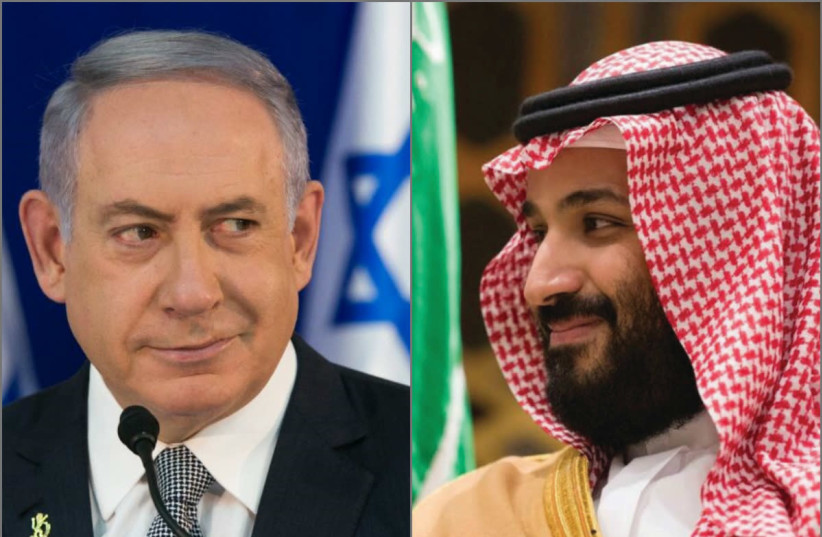Saudi normalization harmed, but still possible with win over Iran or Hamas
Following Channel 13’s Sunday series of interviews with ex-Biden administration officials about Israel’s missed chances to normalize with the Saudis, although Prime Minister Benjamin Netanyahu’s playing field has significantly slowed and harmed this opportunity, there are still at least two surprising pathways to that crown jewel of Israeli-Arab normalization, The Jerusalem Post has learned.
Top Israeli sources acknowledge that the classic and easiest pathway to normalization has been and remains an end to the Gaza war, placing a reformed Palestinian Authority in charge of Gaza along with moderate Arab allies, and progress toward a two-state vision, even if falling short of an actual two-state new reality.
But they argue that there are two other potential distinct paths which are more in line with Netanyahu’s current regional vision, which could also lead to normalization with Riyadh.
Surprisingly, one of the pathways is a complete defeat of Hamas in Gaza.
Although this would require continuing the war for some substantial additional time and many defense officials believe such a goal is unattainable given various constraints, others argue that both the Saudis and Egypt (unlike Qatar and Turkey) want Hamas removed from Gaza, given that they view it as an extension of the Muslim Brotherhood which has threatened their countries as well.

Really, the objection of many moderate Arab regimes who loathe Hamas is that Israel has failed to remove Hamas for over 18 months, and if it continues to fail, then continuing the war is pointless and only undermines their stability and the stability of the region.
But in a theoretical scenario in which Israel could remove Hamas in a “reasonable” amount of time, they might view it as such a positive game changer toward greater future stability against the Muslim Brotherhood in the region, that they might move toward normalization.
Israel would still likely need to make moves toward increasing trends of Palestinian self-determination, but even Jerusalem might object to this less, if in fact Hamas was removed.
The second distinct potential pathway, surprisingly, has nothing to do with the Palestinians but with Iran.
In public, the Saudis currently oppose an Israeli strike on Tehran’s nuclear program and favor a new nuclear deal being negotiated by US President Donald Trump.
Unlike in 2015 when Riyadh opposed the Obama administration’s nuclear deal, in 2025 the Saudis are ready to sign on to Trump’s, even if it has holes in it.
The reasons for this change are complex, but the primary Saudi position currently is to support a diplomatic resolution to the Iranian nuclear crisis.
However, as with Gaza, there are other less likely scenarios, which could lead the Saudis to switch sides and even normalize with Israel without a full change of the picture on the Palestinian front.
At the end of the day, the Saudis primary concern is stability and their primary threat is still the Islamic Republic, and its potential nuclear weapons, and not Hamas.
What happens if Israel is successful?
In the event that Israel actually succeeded in destroying Iran’s nuclear program, some top Israeli officials believe the Saudis would be so enthusiastic about the removal of that threat that they would move to normalize with Jerusalem simply based on that radical outcome and the new cornerstone of regional stability.
As such, the Saudis are not actually against an Israeli airstrike on Tehran’s nuclear program that completely succeeds and leaves them untouched.
Rather, they worry that such an airstrike will not succeed sufficiently and will leave the threat intact, which will lead the Iranians to push harder for nuclear weapons, or that the Islamic Republic will respond to such a strike by mortally wounding the Saudi economy and ravaging some Saudi cities.
In 2019, Iran struck large portions of the Saudi economy, and Riyadh still does not believe it can defend against such a strike from Tehran.
As above with the Palestinians, this is why the Saudis prefer diplomacy and have even been sending top officials to get closer with Iran – namely, they want to avoid high risks to themselves and the region.
Yet, if Israel took the high risk and rolled out a perfect outcome that did not harm Riyadh and removed the Iranian nuclear threat, the Saudis might very well shift from their risk-averse standard position to wanting to get closer to Israel as its broader protector and ally.





Comments are closed.